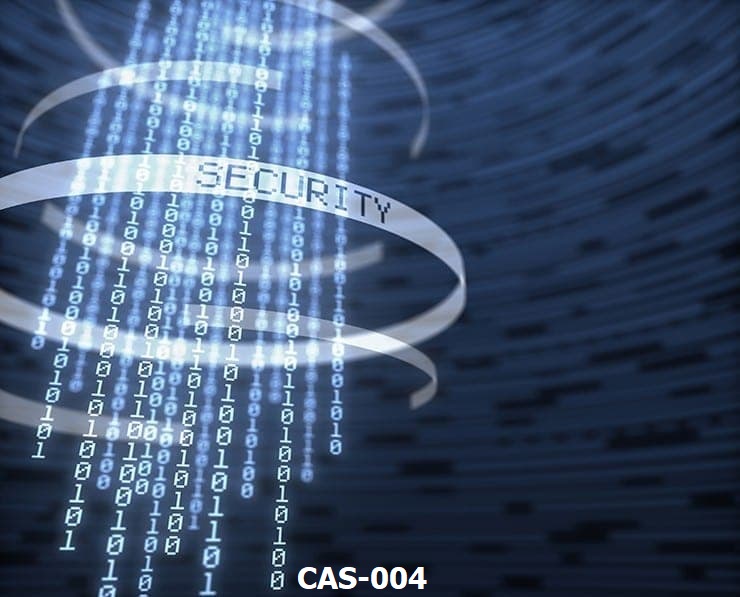Student Feedback
CAS-003: CompTIA Advanced Security Practitioner (CASP+) CAS-003 Certification Video Training Course Outline
Course Introduction
Chapter 01 - Understanding Risk ...
Chapter 02 - Network and Securit...
Course Introduction
CAS-003: CompTIA Advanced Security Practitioner (CASP+) CAS-003 Certification Video Training Course Info
CASP+ Certification (CAS-003) Course – Expert-Level Cybersecurity Skills
Advanced Security Practitioner CAS-003 Prep Course
What You Will Learn From This Course
• Master the skills required to successfully pass the CompTIA Advanced Security Practitioner (CASP+) CAS-003 exam
• Understand enterprise security architecture and operations at an advanced level
• Apply risk management strategies to complex IT environments
• Gain expertise in cybersecurity research, analysis, and collaboration across enterprise systems
• Develop the ability to conceptualize, design, and implement secure solutions in large-scale IT infrastructures
• Learn advanced techniques for integrating IT, business, and communication systems securely
• Enhance critical thinking and judgment in cybersecurity decision-making
• Build hands-on skills for securing enterprise networks, systems, and applications
• Understand how to evaluate and mitigate security risks while aligning solutions with organizational goals
• Gain insights into emerging threats, vulnerabilities, and enterprise-level mitigation strategies
• Learn methods for managing and responding to security incidents effectively
• Develop the knowledge to handle technical challenges involving cloud computing, virtualization, and hybrid enterprise environments
Learning Objectives
The primary goal of this course is to prepare IT professionals for the CASP+ CAS-003 exam while equipping them with advanced cybersecurity skills applicable in real-world enterprise environments. By the end of the course, students will be able to:
• Assess enterprise-level security requirements and design comprehensive security solutions
• Integrate multiple security disciplines including network, application, endpoint, and data security
• Perform risk assessments and apply mitigation strategies aligned with organizational objectives
• Implement advanced security policies, controls, and procedures across complex IT systems
• Apply knowledge of cryptography, identity management, and access control in enterprise contexts
• Analyze security threats, vulnerabilities, and incidents to develop actionable solutions
• Plan, implement, and manage enterprise security operations, ensuring compliance with industry standards
• Utilize research and collaboration techniques to solve enterprise-level cybersecurity challenges
• Leverage advanced technical skills for cloud security, virtualization, and secure communications
• Apply critical thinking to resolve complex security problems while balancing business and technical requirements
Target Audience
This course is designed for experienced IT professionals seeking to advance their careers in cybersecurity and enterprise security management. The ideal participants include:
• IT security specialists aiming to achieve a senior-level certification in advanced security
• Security architects responsible for designing and managing secure enterprise infrastructures
• Risk managers and analysts focusing on cybersecurity governance and compliance
• Information security analysts and IT professionals managing technical security operations
• Penetration testers and ethical hackers looking to expand their knowledge into enterprise-level security
• Cybersecurity professionals interested in mastering risk management, security integration, and incident response
• IT administrators who aspire to move from general IT management roles into advanced security leadership positions
• Professionals looking to strengthen their knowledge in emerging technologies including cloud, virtualization, and hybrid IT environments
• Enterprise security consultants seeking to provide high-level security solutions for complex organizations
• Anyone with significant hands-on experience in IT security operations and a desire to achieve a globally recognized CASP+ certification
Requirements
This course is designed for experienced IT professionals. While there are no strict prerequisites, students should have a solid understanding of enterprise IT systems and technical security practices. The course assumes familiarity with IT administration, cybersecurity fundamentals, and hands-on technical experience in enterprise environments.
Prerequisites
To maximize success in this course, students are recommended to meet the following prerequisites:
• A minimum of ten years of experience in IT administration, with at least five years of hands-on technical security experience
• Familiarity with CompTIA Security+ concepts or equivalent practical experience in IT security
• Understanding of enterprise networks, servers, databases, and applications
• Experience in applying security policies, risk management strategies, and incident response techniques
• Knowledge of cryptography, identity management, and access control principles
• Exposure to cloud computing, virtualization, and hybrid IT infrastructure environments
• Practical experience in monitoring, managing, and securing complex IT systems
• Ability to analyze technical security challenges and implement appropriate solutions
• Awareness of compliance, governance, and regulatory requirements in enterprise security contexts
• Willingness to engage in advanced technical exercises, labs, and scenario-based learning
This course equips students to confidently approach advanced cybersecurity challenges and prepares them for a successful career as a certified CompTIA Advanced Security Practitioner. It emphasizes practical, hands-on application, strategic thinking, and enterprise-level security knowledge. Students will not only prepare for the CASP+ CAS-003 exam but also gain the skills necessary to design, implement, and manage robust security solutions across complex IT environments. The course’s structured approach ensures participants build strong technical capabilities while understanding the broader business and risk implications of security decisions. By completing this program, students will emerge as capable, strategic security professionals ready to take on senior-level responsibilities in cybersecurity and enterprise IT.
Course Modules / Sections
The CompTIA Advanced Security Practitioner CAS-003 course is structured into several comprehensive modules designed to provide a deep understanding of enterprise security concepts and advanced cybersecurity practices. Each module builds upon the previous one to ensure a thorough grasp of theoretical knowledge and hands-on skills required for securing complex IT environments.
The first module introduces students to enterprise security fundamentals and the overall landscape of advanced cybersecurity practices. It emphasizes understanding the core principles of risk management, the importance of regulatory compliance, and the role of strategic decision-making in enterprise security operations. Students gain a foundation in integrating IT, business, and communication disciplines, which serves as a backbone for more technical topics covered later in the course.
The second module focuses on risk management strategies. This module covers threat and vulnerability assessment, risk analysis techniques, and the application of mitigation strategies across enterprise systems. Students learn to evaluate security gaps, prioritize risks, and implement policies that align with organizational objectives. The module emphasizes practical exercises and real-world scenarios to strengthen decision-making and judgment in high-stakes security environments.
The third module covers enterprise security architecture and operations. Students explore the design and implementation of secure enterprise networks, systems, and applications. Topics include the configuration of secure network infrastructures, deployment of access controls, and integration of multiple security disciplines to provide cohesive protection. Students also examine secure system design for cloud environments, virtualization platforms, and hybrid infrastructures, gaining insights into modern enterprise deployments.
The fourth module centers on research, collaboration, and innovation in cybersecurity. Students learn to conduct advanced security research, analyze emerging threats, and collaborate with cross-functional teams to develop effective solutions. Emphasis is placed on using analytical frameworks and industry best practices to inform security strategies. This module encourages a proactive approach to security by teaching students how to anticipate and respond to evolving threats within enterprise environments.
The fifth module focuses on integration of enterprise security solutions. Students gain hands-on experience designing and implementing comprehensive security strategies that combine technical controls, policies, and processes. They learn to map solutions to organizational requirements while balancing business objectives, risk mitigation, and compliance mandates. The module emphasizes the importance of aligning security initiatives with overall enterprise goals, providing students with a strategic perspective on cybersecurity implementation.
The sixth module introduces incident response and disaster recovery strategies. Students explore methods for detecting, analyzing, and mitigating security incidents while ensuring business continuity. The module includes exercises on creating response plans, testing recovery procedures, and maintaining resilience in the face of sophisticated cyber threats. Students gain practical experience in managing security events and minimizing organizational impact through structured response mechanisms.
The final module provides exam preparation and review, focusing on consolidating knowledge, practicing problem-solving, and simulating real-world scenarios. Students engage in practice exams, scenario-based exercises, and review sessions that reinforce key concepts from all previous modules. This module ensures students are fully prepared to demonstrate their expertise in advanced security practices and pass the CASP+ CAS-003 exam confidently.
Key Topics Covered
The CASP+ CAS-003 course covers a broad spectrum of advanced cybersecurity topics critical for enterprise security professionals. Each topic is designed to build technical knowledge, enhance practical skills, and strengthen decision-making capabilities.
Risk management is a central topic, including threat and vulnerability analysis, risk assessment frameworks, and mitigation planning. Students learn to identify potential security threats, analyze their impact, and prioritize risk-reduction strategies effectively. Techniques for risk communication, reporting, and collaboration with organizational stakeholders are emphasized, preparing students to manage risk at a strategic level.
Enterprise security architecture is another critical topic. Students explore network design, system hardening, identity and access management, and secure application deployment. This section emphasizes the integration of multiple security layers to create a resilient infrastructure capable of withstanding advanced cyber threats. Students also learn secure configuration practices for cloud computing, virtualization, and hybrid enterprise environments.
Research and collaboration are covered extensively, with students learning to analyze emerging threats, conduct security audits, and collaborate with cross-functional teams. Emphasis is placed on leveraging analytical tools, industry reports, and threat intelligence to inform security strategies. Students gain the ability to anticipate security challenges and implement innovative solutions proactively.
Integration of enterprise security solutions focuses on implementing cohesive security strategies. Students learn to combine technical controls, policies, and operational processes to achieve comprehensive protection. Topics include aligning security initiatives with business objectives, managing compliance requirements, and ensuring that security investments are cost-effective and impactful.
Incident response and disaster recovery are critical areas, covering detection, containment, eradication, and recovery procedures. Students gain hands-on experience in developing and executing response plans, testing recovery protocols, and ensuring business continuity under adverse conditions. Emphasis is placed on minimizing operational disruption and maintaining resilience against sophisticated attacks.
Advanced technical topics include cryptography, secure communications, endpoint security, and advanced network defense. Students explore encryption methods, secure protocols, multi-factor authentication, and intrusion detection systems. The course also addresses emerging technologies and threats, ensuring students are prepared to protect enterprise systems in dynamic and evolving IT landscapes.
Compliance and governance are integrated throughout the curriculum. Students learn to apply industry standards, regulatory requirements, and organizational policies to enterprise security operations. Topics include data privacy regulations, cybersecurity frameworks, audit procedures, and reporting practices. Students gain the ability to balance technical security measures with legal, regulatory, and business constraints.
Teaching Methodology
The CASP+ CAS-003 course uses a blended teaching methodology that combines theoretical instruction with practical, hands-on exercises. Lectures provide detailed explanations of core concepts, risk management principles, and advanced cybersecurity strategies. Each module includes real-world scenarios that allow students to apply knowledge in realistic enterprise contexts.
Interactive labs form a significant part of the methodology, giving students practical experience in configuring secure systems, deploying security controls, and managing incidents. Students work through exercises simulating enterprise environments, tackling challenges such as network breaches, policy violations, and advanced persistent threats. This hands-on approach ensures that theoretical knowledge is reinforced with practical skills applicable to real-world situations.
Collaborative learning is also emphasized. Students participate in group discussions, case studies, and peer review exercises that enhance problem-solving, teamwork, and communication skills. By working together on complex scenarios, students learn to approach cybersecurity challenges from multiple perspectives and develop solutions that balance technical, operational, and business considerations.
Scenario-based learning is integrated into each module, requiring students to apply analytical thinking and decision-making to complex problems. These scenarios mirror enterprise-level security challenges, ensuring that students are prepared to handle the kinds of threats and risks encountered in professional environments.
Continuous feedback is provided through assessments, lab evaluations, and instructor guidance. This iterative approach ensures that students identify knowledge gaps, refine skills, and build confidence as they progress through the course. Personalized guidance allows participants to focus on areas requiring additional practice, ensuring a comprehensive understanding of advanced cybersecurity principles.
Assessment & Evaluation
Assessment and evaluation are integral to the CASP+ CAS-003 course, ensuring students achieve mastery of both theoretical knowledge and practical skills. Evaluations are designed to measure understanding of key concepts, application of skills, and readiness for the CASP+ certification exam.
Quizzes and module assessments are administered throughout the course to test comprehension of individual topics. These assessments cover risk management, enterprise security architecture, integration of security solutions, incident response, and advanced technical subjects. Regular evaluation reinforces learning, encourages retention of key concepts, and highlights areas requiring additional focus.
Practical labs are assessed based on accuracy, completeness, and adherence to best practices. Students demonstrate their ability to implement secure systems, deploy controls, and respond to simulated security incidents. Lab evaluations provide a hands-on measure of competency, ensuring participants can translate knowledge into real-world application.
Scenario-based exercises form a significant component of evaluation. Students are presented with complex enterprise security challenges and must apply critical thinking, problem-solving, and technical expertise to develop effective solutions. These exercises test not only technical skills but also strategic decision-making and risk management capabilities.
Final assessments simulate the CASP+ CAS-003 exam format, combining multiple-choice questions, performance-based tasks, and scenario analysis. This comprehensive evaluation ensures students are fully prepared for the certification exam and capable of performing advanced security tasks in professional settings.
Performance feedback is provided continuously throughout the course. Instructors review student work, offer guidance, and recommend strategies for improvement. This feedback loop allows students to refine their skills, address knowledge gaps, and build confidence in their ability to manage enterprise-level security challenges.
Completion of the course demonstrates proficiency in enterprise security, advanced risk management, integration of security solutions, and strategic cybersecurity decision-making. Students emerge ready to achieve CASP+ CAS-003 certification and excel in senior cybersecurity roles.
Benefits of the Course
The CompTIA Advanced Security Practitioner CASP+ CAS-003 course provides numerous benefits for IT professionals seeking to advance their careers in enterprise cybersecurity. By completing this program, students gain internationally recognized certification that demonstrates their proficiency in advanced security principles, risk management, and enterprise system protection. This credential validates expertise in managing complex cybersecurity challenges across diverse IT environments, enhancing professional credibility and career opportunities.
Participants acquire advanced technical skills necessary to design, implement, and manage secure enterprise networks, systems, and applications. They learn how to apply security policies, controls, and procedures effectively while balancing organizational requirements, compliance standards, and risk mitigation strategies. The hands-on nature of the course ensures that students can translate theoretical knowledge into real-world application, preparing them to address current and emerging security threats.
The course also strengthens strategic thinking and decision-making capabilities. Students learn to assess risks, evaluate vulnerabilities, and implement mitigation strategies that align with business objectives. This approach ensures that security initiatives support organizational goals while minimizing exposure to cyber threats. The focus on enterprise-level security challenges prepares participants for leadership roles in cybersecurity, risk management, and IT governance.
Another key benefit is exposure to emerging technologies and modern IT environments, including cloud computing, virtualization, and hybrid infrastructure. Students gain practical experience in securing complex systems, implementing advanced identity management, and deploying secure communication protocols. This expertise positions graduates to adapt to rapidly evolving technology landscapes and provide effective security solutions in dynamic enterprise settings.
The course also emphasizes incident response and disaster recovery planning. Students learn to detect, analyze, and respond to security incidents while maintaining business continuity. This capability is critical for organizations facing sophisticated cyber attacks and regulatory compliance requirements. By mastering these skills, students enhance their ability to protect enterprise assets, reduce operational risk, and contribute to organizational resilience.
Completing the CASP+ CAS-003 course increases career prospects and potential earning opportunities. Graduates are well-prepared for senior security roles such as security architect, risk manager, information security analyst, and penetration tester. The certification demonstrates a commitment to professional development, making candidates more competitive in the job market and attractive to employers seeking advanced security expertise.
The course also fosters collaboration and communication skills. Students learn to work effectively with cross-functional teams, communicate complex security concepts to non-technical stakeholders, and influence organizational security strategies. This ability is essential for senior-level roles where cybersecurity decisions impact multiple departments and require alignment with broader business objectives.
Finally, the CASP+ CAS-003 course provides a structured path to continuous learning. Graduates gain access to ongoing resources, industry updates, and best practices, ensuring that their knowledge remains current in a rapidly evolving cybersecurity landscape. This lifelong learning component enhances professional growth, keeps skills relevant, and supports sustained career advancement in enterprise security.
Course Duration
The CompTIA Advanced Security Practitioner CASP+ CAS-003 course is designed to be flexible and comprehensive, accommodating the schedules of working professionals. The total duration of the course typically ranges between eight and twelve weeks, depending on the learning format, pace, and participant engagement.
The course is divided into structured modules, each focusing on key aspects of enterprise security and advanced cybersecurity practices. Students are encouraged to dedicate consistent study time to each module to fully understand concepts, participate in hands-on labs, and complete scenario-based exercises. This modular approach allows learners to progress at a manageable pace while ensuring mastery of all essential topics.
In addition to instructor-led sessions, the course includes self-paced learning components. These allow students to review materials, practice lab exercises, and engage with supplementary resources at their convenience. Self-paced modules are particularly beneficial for participants balancing professional responsibilities, as they provide flexibility without compromising learning outcomes.
Practical labs and scenario-based exercises are integrated throughout the course. These activities typically require additional time outside of scheduled sessions to complete, depending on the complexity of the tasks. Students should allocate sufficient time to practice configuring secure systems, implementing controls, and responding to simulated security incidents. This hands-on experience reinforces theoretical knowledge and enhances readiness for the CASP+ CAS-003 exam.
The course duration also includes time for review and assessment. Students participate in quizzes, lab evaluations, and final practice exams to consolidate learning and measure readiness for certification. Instructors provide guidance and feedback during these sessions, allowing participants to identify areas requiring further practice and refinement.
Overall, the course duration is structured to provide a comprehensive and immersive learning experience. By committing to the full schedule, students gain the technical expertise, strategic understanding, and practical experience necessary to succeed as advanced security practitioners in enterprise environments.
Tools & Resources Required
To maximize the learning experience in the CASP+ CAS-003 course, students are expected to have access to certain tools and resources. These resources support hands-on labs, scenario-based exercises, and practical application of advanced security concepts.
A personal computer or laptop with sufficient processing power, memory, and storage is required to run virtual machines, security software, and lab simulations. Participants should ensure their systems meet the minimum specifications recommended for virtualization, secure network simulation, and cybersecurity software tools.
A stable internet connection is essential for accessing online course materials, participating in virtual labs, and attending live instructor-led sessions. Reliable connectivity ensures uninterrupted learning, smooth interaction with instructors and peers, and effective engagement with remote lab environments.
Students should have access to virtualization software such as VMware or VirtualBox to create and manage virtual lab environments. These tools allow participants to simulate enterprise networks, deploy security configurations, and test solutions in a controlled setting without impacting live systems.
Security software and tools, including firewalls, antivirus programs, intrusion detection systems, and network monitoring utilities, are recommended for practical exercises. These tools provide hands-on experience in securing enterprise environments, detecting threats, and implementing protective measures. Familiarity with these applications enhances the practical learning component of the course.
Additional resources include study guides, reference materials, and official CompTIA documentation. These resources support theoretical learning, provide exam-specific guidance, and reinforce key concepts. Students are encouraged to review these materials alongside lab exercises to achieve a comprehensive understanding of CASP+ CAS-003 topics.
Collaborative tools such as online forums, discussion boards, and virtual classroom platforms are also valuable. These tools facilitate interaction with instructors and peers, enabling knowledge sharing, problem-solving, and discussion of real-world cybersecurity scenarios. Participation in collaborative environments enhances learning and develops communication skills essential for enterprise security roles.
Finally, students are encouraged to maintain a lab notebook or digital record of exercises, observations, and solutions. Documenting hands-on activities, configurations, and outcomes helps reinforce learning, track progress, and serve as a reference for future professional practice.
By leveraging these tools and resources, participants can fully engage with the course content, gain practical experience, and develop the skills necessary to succeed as certified advanced security practitioners. The combination of technology, reference materials, and collaborative platforms ensures a well-rounded and immersive learning experience, preparing students for both the CASP+ CAS-003 exam and professional enterprise security challenges.
Career Opportunities
The CompTIA Advanced Security Practitioner CASP+ CAS-003 certification opens a wide range of career opportunities for IT professionals seeking senior-level roles in cybersecurity and enterprise security management. Graduates of this course are prepared to assume positions requiring advanced technical knowledge, strategic thinking, and hands-on experience in securing complex IT environments.
Security Architect roles are among the primary career paths for CASP+ certified professionals. Security architects design and implement secure enterprise networks, systems, and applications. They are responsible for creating a comprehensive security strategy, integrating multiple layers of defense, and ensuring that organizational systems remain protected against evolving cyber threats. CASP+ certification demonstrates the expertise necessary to perform these high-level responsibilities effectively.
Risk Manager and Risk Analyst positions are also highly suited for CASP+ professionals. These roles focus on assessing potential threats, analyzing vulnerabilities, and developing mitigation strategies to protect enterprise assets. CASP+ certified individuals possess the skills to evaluate risks at a strategic level, implement governance frameworks, and align security measures with organizational objectives. Their ability to balance technical, business, and regulatory requirements makes them invaluable in enterprise risk management functions.
Information Security Analyst roles benefit significantly from CASP+ training. Analysts monitor networks, investigate security incidents, and implement protective measures to maintain organizational security. The course equips students with advanced analytical skills, threat detection techniques, and incident response capabilities, enabling them to identify and respond to sophisticated attacks efficiently. This expertise enhances operational security and strengthens organizational resilience against cyber threats.
Penetration Tester and Ethical Hacker positions are well-aligned with CASP+ certification. Professionals in these roles conduct simulated attacks to identify vulnerabilities and recommend solutions. The course provides hands-on experience in testing enterprise systems, analyzing threat vectors, and applying advanced security measures. CASP+ certified professionals bring both technical proficiency and strategic insight to these positions, ensuring that vulnerabilities are mitigated effectively.
Cybersecurity Consultant and Enterprise Security Specialist roles also benefit from CASP+ certification. These professionals provide guidance to organizations on security policies, compliance, and advanced security solutions. CASP+ equips students with the knowledge to assess enterprise security postures, design robust defense mechanisms, and advise leadership on risk mitigation strategies. Their expertise supports informed decision-making and strengthens overall security governance.
Cloud Security Specialist and Virtualization Security Engineer positions are increasingly relevant in modern IT environments. CASP+ certified professionals gain exposure to securing cloud-based and virtualized infrastructures, ensuring data integrity, availability, and confidentiality. They implement identity management, access controls, and secure network architectures tailored to hybrid and multi-cloud environments, addressing the growing demand for cloud security expertise in enterprises.
IT Managers and Technical Leads responsible for overseeing cybersecurity operations also benefit from CASP+ certification. The course provides a strategic perspective on security governance, risk management, and enterprise integration, enabling leaders to guide teams effectively, enforce security policies, and implement enterprise-level solutions. CASP+ graduates bring credibility, technical authority, and strategic insight to leadership positions in cybersecurity management.
Additional career paths include Cybersecurity Risk Manager, Security Operations Center (SOC) Analyst, Compliance Specialist, and Incident Response Coordinator. CASP+ certification ensures that professionals in these roles have the advanced technical knowledge, analytical skills, and practical experience required to address complex security challenges, maintain compliance, and protect enterprise assets effectively.
The growing demand for advanced cybersecurity expertise across industries enhances the employability and career prospects of CASP+ certified professionals. Organizations increasingly recognize the importance of hiring individuals capable of securing complex enterprise environments, managing risk, and providing strategic cybersecurity guidance. This demand makes CASP+ certification a valuable credential for career advancement, professional recognition, and competitive advantage in the cybersecurity job market.
Conclusion
The CompTIA Advanced Security Practitioner CASP+ CAS-003 course is a comprehensive program designed to equip IT professionals with the advanced skills and knowledge required to secure enterprise environments and achieve senior-level cybersecurity roles. By completing this course, students gain a globally recognized certification that validates their expertise in enterprise security, risk management, research and analysis, and the integration of IT, business, and communication systems.
This course emphasizes both theoretical understanding and practical application. Students engage in hands-on labs, scenario-based exercises, and real-world simulations that enhance critical thinking, problem-solving, and technical proficiency. The curriculum covers advanced topics including risk management, enterprise security architecture, incident response, cryptography, compliance, and governance. By integrating these elements, the course prepares participants to handle complex security challenges across diverse enterprise environments.
CASP+ certification represents a significant milestone in professional development, signaling expertise, credibility, and leadership potential in cybersecurity. Graduates of the course are equipped to design and implement secure solutions, mitigate risks, respond to security incidents, and align security initiatives with organizational goals. The skills acquired extend beyond exam preparation, providing practical knowledge applicable to real-world enterprise security scenarios.
The course also prepares students for the evolving landscape of IT and cybersecurity. Emerging threats, cloud technologies, virtualization, and hybrid IT environments require advanced security strategies and adaptive thinking. CASP+ graduates are trained to address these challenges proactively, ensuring that organizations remain resilient against increasingly sophisticated cyber threats.
By completing the CASP+ CAS-003 course, students not only gain technical skills but also develop strategic insight. They learn to communicate effectively with stakeholders, lead security teams, and implement solutions that balance technical effectiveness with business objectives. This combination of skills positions graduates for senior roles in cybersecurity, risk management, and enterprise IT leadership.
The structured approach, comprehensive curriculum, and practical focus make this course a valuable investment for IT professionals seeking to enhance their knowledge, advance their careers, and achieve internationally recognized certification. CASP+ certification opens doors to senior security positions, leadership opportunities, and specialized roles in risk management, cloud security, and incident response. The course ensures that students are fully prepared to meet the demands of modern enterprise security environments and excel in professional cybersecurity roles.
Enroll Today
Enrolling in the CompTIA Advanced Security Practitioner CASP+ CAS-003 course is the first step toward achieving advanced cybersecurity expertise and senior-level career opportunities. This course offers a structured and immersive learning experience, combining instructor-led sessions, hands-on labs, scenario-based exercises, and practical assessments designed to prepare students for the CASP+ certification exam.
Students benefit from access to comprehensive study materials, practical exercises, and expert guidance throughout the course. The curriculum is tailored to provide both technical proficiency and strategic understanding, ensuring graduates are capable of addressing complex enterprise security challenges. Participants can develop skills in risk management, secure system design, incident response, and governance, equipping them to make informed decisions and lead security initiatives effectively.
The course is ideal for IT professionals seeking to advance into senior security roles, including security architects, risk managers, information security analysts, penetration testers, cloud security specialists, and enterprise security consultants. CASP+ certification enhances career prospects, professional credibility, and earning potential, making enrollment a strategic investment in long-term career growth.
Enrolling today provides access to a comprehensive learning platform that supports self-paced study, hands-on labs, and interactive learning experiences. Students can engage with instructors, collaborate with peers, and apply knowledge in practical scenarios that mirror real-world enterprise security challenges. The course is designed to build confidence, reinforce critical skills, and prepare participants to achieve certification successfully.
By committing to this course, students gain a competitive advantage in the cybersecurity job market. CASP+ certification demonstrates advanced technical knowledge, strategic thinking, and the ability to manage enterprise-level security operations. It positions graduates for leadership roles, enhances professional recognition, and opens doors to diverse career opportunities in IT security.
Enroll today to begin your journey toward becoming a certified CompTIA Advanced Security Practitioner. Gain the expertise, hands-on experience, and professional recognition necessary to secure enterprise systems, manage risks, and lead advanced cybersecurity initiatives. This course provides the knowledge, skills, and certification required to excel in a dynamic and high-demand field, preparing students for success in senior-level cybersecurity careers.













